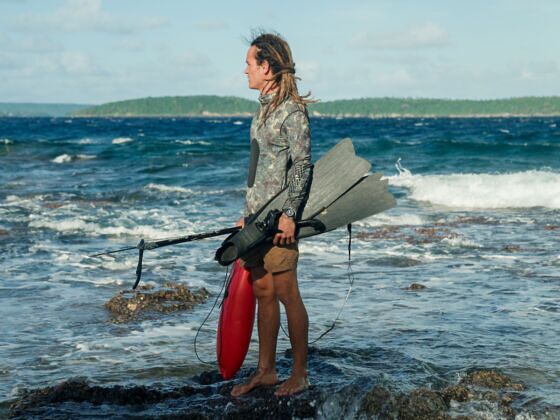In 2020, as COVID-19 spread and cities and small towns around the world came to a halt, the South Pacific country of Tonga faced what would become a years-long shut down. Henry Pott, a whale watching guide on the Tongan island of Vava’u, found himself isolated for more than a year. Whale tourism was on a prolonged hold, he was isolated, and he was pushed to a subsistence lifestyle spearfishing off of the coral reefs, cooking over an open fire, and taking advantage of plentiful coconuts.


How a Whale Watching Guide Stranded on a Tongan Island Survived for More Than a Year During the Pandemic
“I had to do everything on my own,” Pott says in the Matador Network documentary Water & Solitude: The Story of a Tongan Whale Guide. “I did a lot of spearfishing. I was just trying to survive.”
The documentary tells Pott’s story of survival during Tonga’s strict pandemic lockdown, and explores his relationship with the beautiful island of Vava’u. He explains how he was at the mercy of his environment for survival, relying on the ocean for food.
“Sometimes I won’t come out of the water if I don’t have a fish, because no fish, no food,” he says. “Some days I only survived on the coconut.”
The sense of loneliness many experienced during lockdown was amplified even more for Pott, who found himself completely isolated. He is one of three brothers, though his brothers were in Australia during the COVID lockdown. And while he occasionally visited his mother in a nearby village (via a dugout canoe he built), he was largely separated from his family.
“I was out here on the island by myself for a year and a half,” he says, “and it was kind of lonely and sad, because I missed everybody.”
What helped him overcome that loneliness was the same passion that gave him joy before the pandemic began: his relationship with the ocean and the whales. Having grown up in and around the water, he has an innate affinity for marine life.
“Swimming with humpbacks, you feel so small,” he says. “They’re pretty amazing. When you’re in the water with them, you can see the ocean is so big, and you know you’re just a tiny creature. I don’t know what we would do without whales.”
While Pott’s lockdown-induced isolation ended in 2022, he wasn’t able to resume whale watching tours until 2023 due to the underwater eruption of the Hunga-Tonga Hunga-Ha’apai volcano, which produced a series of devastating tsunamis. It wasn’t until over a year after the 2022 eruption that Tonga reopened its borders to tourists, allowing whale watching tours to resume.
Potts, for one, is grateful to finally share his island with visitors again.
“Taking people out everyday is a different day, it’s not the same all the time,” he says. “For me, that’s my favorite thing to do. I don’t know what kind of job can be better than that. I love it.”